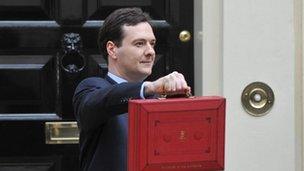Budget 2013: Osborne to unveil extra £2.5bn in cuts
- Published

George Osborne is coming under pressure to increase spending on infrastructure
The government is to announce further spending cuts in Wednesday's Budget, with the savings going to large-scale infrastructure projects designed to boost economic growth.
Most Whitehall departments will have to cut 2% of their spending over the next two years, amounting to about £2.5bn.
But health, schools and HM Revenue & Customs budgets will be unaffected.
The cuts come on top of the 3% spending reductions announced for the next two years in last year's Autumn Statement.
In its 2010 spending review, the government originally announced departmental spending cuts averaging 19% - equivalent to £81bn - up to 2014-2015.
Chancellor George Osborne told his colleagues of the new austerity measures at Tuesday's cabinet meeting.
Overseas aid will also be shielded from the cuts, while local government and police budgets will be protected for the first year.
Unspent cash
However, other government departments - such as justice, environment and Scotland, Wales and Northern Ireland - will be told to deliver a further 1% cut to their day-to-day budgets in both 2013-14 and 2014-15.
A No 10 spokesman said the move had been made possible by under-spending by government departments this year, which "reflected the success that secretaries of state across the board have had, working with the Treasury, on bringing departmental resource spending down".
The Ministry of Defence is being given special leeway to roll over unspent cash worth £1.6bn over the next two years.
Total annual underspends across Whitehall have averaged about £6bn since 2007 and the figure for 2012-3 will be announced on Wednesday.
Energy Secretary Ed Davey, whose department will have to find extra savings, denied ministers had been taken by surprise by the chancellor's announcement, saying they had been given "more notice" of it than expected.
'More of the same'
"What was really noticeable around the cabinet table was people supporting the overall approach not only of the chancellor but the Chief Secretary to the Treasury Danny Alexander," he told the BBC.
"We have to get to grips with this (the deficit). In countries where they don't they're paying a very heavy price."
The government has come under pressure to increase spending on capital projects, such as roads and housing, with its critics saying it is not doing enough to help economic growth.
Lib Dem Business Secretary Vince Cable has led calls for this in cabinet but David Cameron and Nick Clegg have previously ruled out funding such a move by increased borrowing.
For Labour, shadow Treasury minister Chris Leslie said: "If this is the only additional investment in infrastructure in the Budget, it will be a huge disappointment.
"Business groups, the IMF and even Vince Cable have all said now is the right time to invest, at record low interest rates, in building homes, road and schools to create jobs now and strengthen our economy for the future.
"The test for the Budget is whether it delivers bold action to kick-start our flatlining economy and significant tax cuts for middle and low income families, not a £3bn tax cut for the very richest and more of the same failing policies."
The TUC estimated that the extra £2.5bn a year for infrastructure would "boost growth by a measly 0.06%".
"With interest rates negative in real terms, the chancellor has the perfect opportunity to invest in Britain's future, rather than raiding departmental budgets to cover his failed economic strategy," said its general secretary Frances O'Grady.
Beer duty
Government policy on alcohol pricing is also expected to be announced by the chancellor, following reports the government has ditched plans for 45p per unit minimum alcohol pricing.
BBC political editor Nick Robinson says Mr Osborne may be considering scrapping the beer duty escalator - which automatically increases alcohol duty by 2% above inflation every year.
If so, he will feel under pressure to increase taxes on cheap but strong alcoholic drinks to show that the government has not abandoned David Cameron's campaign to crack down on cheap booze, our correspondent says.
A boost for house-building and an extension of the government's NewBuy scheme, which helps people with small deposits buy newly built homes, may also be included.
Mr Osborne - who will carry out of a review of spending for 2015-6 in June - is under pressure due to the lack of growth in the economy and the loss of the UK's AAA credit rating last month. The government's target for eliminating the structural deficit has already slipped to 2017-8.
The Office for Budget Responsibility will publish its latest forecasts for economic growth and borrowing alongside the Budget.
Asked on Tuesday how the government planned to spend revenue raised by bringing forward state pension changes by a year to 2016, Downing Street said some of it would go to paying for the cap on social care costs.
A spokesman said the Treasury would announce in "due course" how the remainder would be spent.